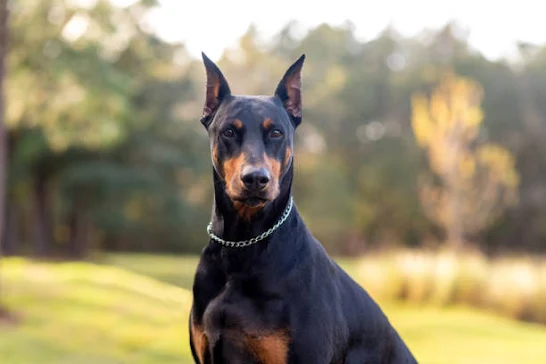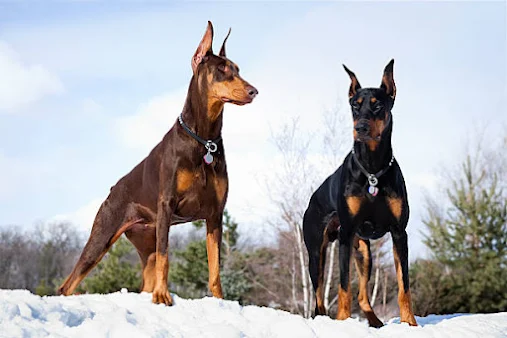Doberman Pinscher: Loyal Friend or Real Monster?
When it comes to dog breeds, the Doberman Pinscher often sparks a mix of curiosity and intrigue. Known for their sleek appearance and confident demeanor, these dogs have garnered a reputation as both loyal companions and formidable protectors. However, like any breed, there are misconceptions and stereotypes surrounding the Doberman Pinscher. In this article, we will delve into the world of this remarkable breed, exploring their history, temperament, and debunking common myths. So, let's unravel the truth about the Doberman Pinscher and discover whether they are truly a loyal friend or a real monster.
The Doberman Pinscher Dog Breed: A Brief Overview
The Doberman Pinscher, often referred to simply as the Doberman, is a medium to large-sized breed that originated in Germany in the late 19th century. They were initially bred by a tax collector named Louis Dobermann, who sought a loyal and protective dog to accompany him during his rounds. Through careful breeding, Dobermann aimed to create a versatile working dog with exceptional intelligence, strength, and loyalty.
Physical Characteristics
Doberman Pinschers are known for their elegant appearance and muscular build. They have a short coat that comes in various colors, including black, blue, red, and fawn. One distinctive feature of the Doberman is their cropped ears and docked tail, although these practices are becoming less common in many countries due to changing attitudes towards cosmetic alterations.
Temperament and Personality
Contrary to popular belief, Doberman Pinschers are not inherently aggressive or vicious. In fact, they are known for their loyalty, intelligence, and affectionate nature towards their families. These dogs are highly trainable and excel in various activities, such as obedience, agility, and even therapy work. With proper socialization and training, Dobermans can be excellent family pets and trusted companions.
Debunking Myths: Separating Fact from Fiction
Myth 1: Doberman Pinschers are naturally aggressive.
Reality: While the Doberman Pinscher has a reputation for being protective, it is important to note that aggression is not an inherent trait of the breed. Like any dog, their behavior is influenced by genetics, socialization, and training. Responsible breeding and early socialization play a crucial role in shaping a Doberman's temperament. With proper care and training, Dobermans can be gentle and loving family pets.
Myth 2: Doberman Pinschers have a high prey drive.
Reality: While Dobermans possess a natural instinct to chase and pursue, it does not necessarily mean they have a high prey drive. With proper training and guidance, Dobermans can coexist peacefully with other animals, including small pets. Early socialization and positive reinforcement training are key to ensuring a well-rounded Doberman who understands appropriate behavior around other animals.
Myth 3: Doberman Pinschers are not good with children.
Reality: Doberman Pinschers can be excellent companions for children when properly socialized and trained. They are known for their protective nature and can form strong bonds with their human family members, including children. However, as with any dog, supervision and teaching children how to interact with dogs safely is essential to prevent any potential accidents.
Myth 4: Doberman Pinschers are difficult to train.
Reality: On the contrary, Doberman Pinschers are highly intelligent and eager to please their owners. They respond well to positive reinforcement training methods and thrive when given mental stimulation and regular exercise. Consistency, patience, and positive reinforcement are the keys to successfully training a Doberman Pinscher.
Myth 5: Doberman Pinschers are prone to aggression towards strangers.
Reality: While Dobermans can be naturally wary of strangers, they are not inherently aggressive towards them. Early socialization and proper training can help Dobermans develop confidence and discernment when it comes to interacting with unfamiliar people. With proper guidance and positive experiences, Dobermans can be friendly and well-mannered in public settings.
Frequently Asked Questions (FAQ)
Q1: Are Doberman Pinschers good family pets?
A1: Yes, Doberman Pinschers can make excellent family pets. They are loyal, protective, and form strong bonds with their human family members. Proper socialization and training are essential to ensure a well-behaved and well-adjusted Doberman in a family setting.
Q2: Do Doberman Pinschers require a lot of exercise?
A2: Yes, Doberman Pinschers are an active breed that requires regular exercise to keep them physically and mentally stimulated. Daily walks, playtime, and engaging activities are necessary to prevent boredom and promote their overall well-being.
Q3: Are Doberman Pinschers suitable for first-time dog owners?
A3: While Doberman Pinschers are intelligent and trainable, they may not be the best choice forfirst-time dog owners. They require a firm and experienced handler who can provide consistent training and socialization. However, with the right guidance and commitment, first-time owners can successfully raise a Doberman Pinscher.
Q4: Do Doberman Pinschers get along well with other pets?
A4: With proper socialization and training, Doberman Pinschers can coexist peacefully with other pets, including cats and smaller animals. Early introductions and positive experiences are key to fostering a harmonious relationship between a Doberman and other animals in the household.
Q5: How can I ensure the health and well-being of my Doberman Pinscher?
A5: Regular veterinary check-ups, a balanced diet, exercise, and mental stimulation are essential for maintaining the health and well-being of a Doberman Pinscher. Additionally, providing a loving and stimulating environment, along with plenty of social interaction, will contribute to their overall happiness and quality of life.
Conclusion
In conclusion, the Doberman Pinscher is a remarkable breed that has been unfairly stigmatized over the years. While they possess a strong protective instinct, they are not inherently aggressive or dangerous. With responsible breeding, early socialization, and proper training, Dobermans can be loyal, loving, and well-behaved companions. It is important to separate fact from fiction and debunk the myths surrounding this breed. By understanding their true nature and providing them with the care they deserve, the Doberman Pinscher can be a loyal friend and a cherished member of the family.
Remember, if you're considering adding a Doberman Pinscher to your family, it is crucial to do thorough research, seek guidance from reputable breeders or rescue organizations, and ensure that you have the time, resources, and commitment to meet their needs. With the right approach, the Doberman Pinscher can be a wonderful addition to your life, bringing joy, companionship, and a lifetime of unforgettable moments.
Keyboards:







